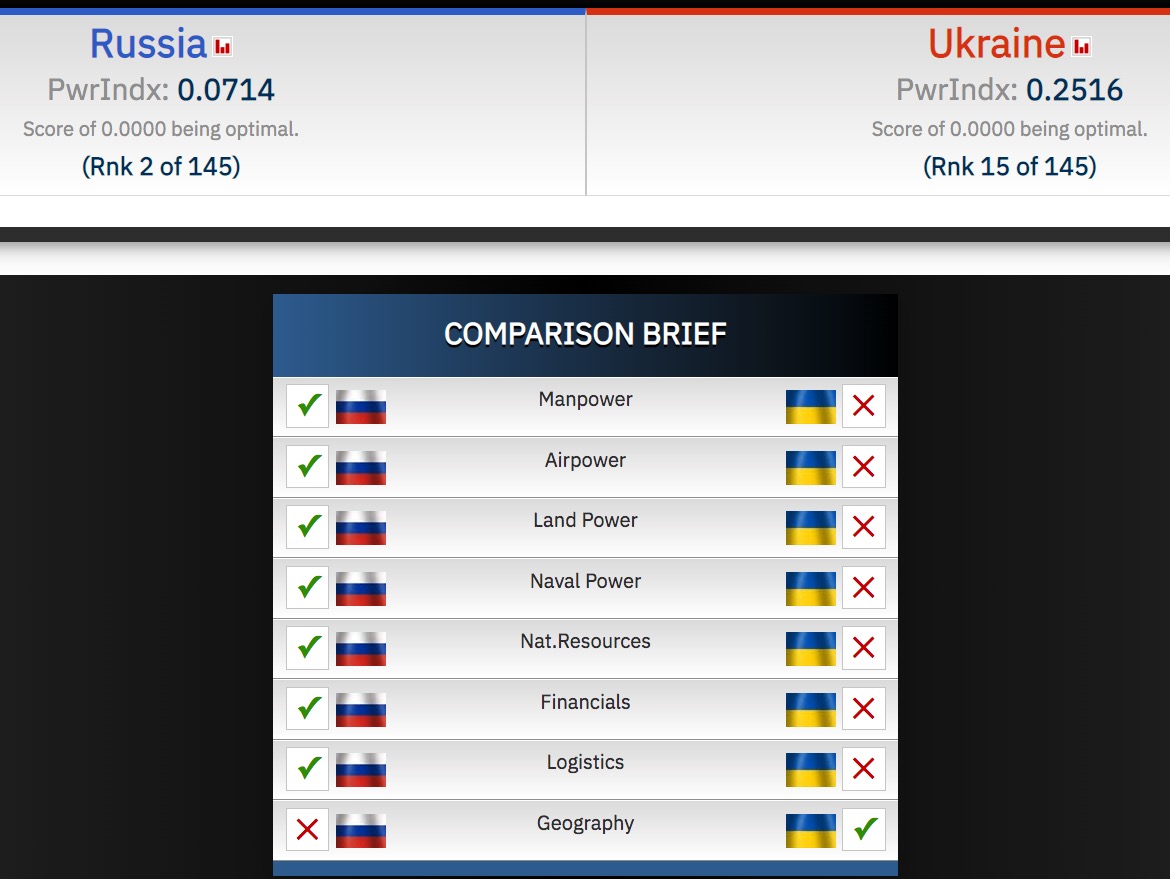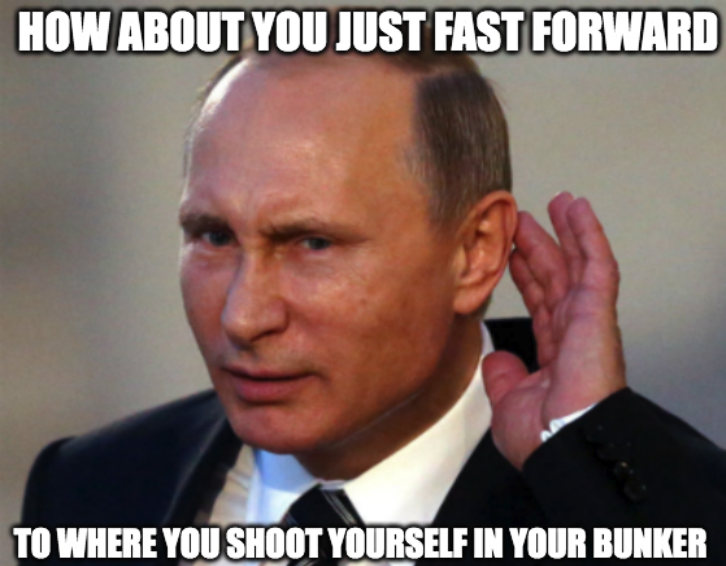It looks like you're using an Ad Blocker.
Please white-list or disable AboveTopSecret.com in your ad-blocking tool.
Thank you.
Some features of ATS will be disabled while you continue to use an ad-blocker.
2
share:
Yes, it irks me to think of this solution, but no doubt some are pushing complete regime change and that's gonna cost literally a bloody fortune in
lives, and materials. It feels like a monumental waste and a drain of mostly innocent lives, I know it's simplistic but look at Yugoslavia, there were
billions spent trying to improve that mudhole and as soon as the world turned its attention elsewhere they destroyed the nice new stuff we all
built.
Hell put the materials in the defense of Taiwan. Pretty sure 30 Abrams tanks could make a difference there.
So I put this in general chit-chat for a reason, though I'm sure mods will be right on this and move it immediately, it's here because we have enough threads on Putin is Hitler and we must fight them on the beaches and in fields and we will never surrender. Obviously, this is our governments' mantra and they have said it enough that a significant portion believes them wholely and completely and it is what it is.
but wouldn't a few well-placed billions of dollars in a few right hands currently in the Kremlin, could end this in a month or so? If not sooner? Saves innocent lives on all sides evicts Putin, and puts a gracious and agreeable person leading in Russia.
Cecil shows it would have likely worked in Vietnam and that would have been paying every Vietnamese citizen a lump sum
www.straightdope.com...
side note the STRAIGHT DOPE was an obsession as a young adult, such thought-provoking questions and humorous, informative answers. ie thinking out of the box kind of stuff.
Hell put the materials in the defense of Taiwan. Pretty sure 30 Abrams tanks could make a difference there.
So I put this in general chit-chat for a reason, though I'm sure mods will be right on this and move it immediately, it's here because we have enough threads on Putin is Hitler and we must fight them on the beaches and in fields and we will never surrender. Obviously, this is our governments' mantra and they have said it enough that a significant portion believes them wholely and completely and it is what it is.
but wouldn't a few well-placed billions of dollars in a few right hands currently in the Kremlin, could end this in a month or so? If not sooner? Saves innocent lives on all sides evicts Putin, and puts a gracious and agreeable person leading in Russia.
Cecil shows it would have likely worked in Vietnam and that would have been paying every Vietnamese citizen a lump sum
www.straightdope.com...
Dear Cecil: When I was in an artillery unit in Vietnam, we were told that each shell we fired cost the taxpayers several thousand dollars to manufacture, disregarding the cost to develop the weapon itself or the cost of training the manpower to shoot it. We speculated that, considering the great number of rounds we fired, the United States could easily have instead built each Vietnamese a beautiful suburban house complete with swimming pool instead of spending the money trying to kill them. In that way we could have not only won the war but also the hearts and minds of the enemy. So I put it to you: if the cost in dollars of the Vietnam war were divided by the number of Vietnamese, how much could each have been paid to lay down their arms and live peacefully ever after? Stephen Wilhelm, New York
Cecil replies:
Best damn question I’ve had in months. Let’s take it step by step.
Estimates of the cost of the Vietnam war vary all over the place, with one analyst putting the figure as high as $900 billion. But that includes all kinds of indirect and future costs — 21st century veterans’ benefits, the cost of inflation resulting from the war, you name it. A bit too blue-sky for our purposes.
The Defense Department in the 1970s came up with a much more conservative figure — $140 billion in direct military outlays between 1965 and 1974. This includes some Pentagon overhead, i.e., money that presumably would have been spent whether there was a war or not. However, other estimates of “incremental” costs run anywhere from $112 billion to $155 billion, so we’re probably safe in going with 140.
The combined population of North and South Vietnam in 1969, the midpoint of substantial U.S. involvement, was somewhere around 39 million. That means that over 10 years we spent about $3,600 for every Vietnamese man, woman, and child. Today you could buy most of a Yugo with that kind of money. At first glance, hardly enough reason to abandon a war of national liberation.
But let’s put this in perspective. Per capita annual income in South Vietnam in 1965 by one estimate was $113. At $3,600 per, we could have kept those guys in rice and fish sauce for pretty much the rest of their lives, with color TV and a Barcalounger thrown in. As an added bonus, the country would not have suffered incalculable war damage, and 1.8 million more Vietnamese would not be dead (or at least they would have died other than by being shot, blown up, etc.).
I know, I know: millions for defense but not one cent for bribes. But considering how things actually turned out, maybe we should have given it a try.
Cecil Adams
side note the STRAIGHT DOPE was an obsession as a young adult, such thought-provoking questions and humorous, informative answers. ie thinking out of the box kind of stuff.
edit on 26-1-2023 by putnam6 because: (no reason given)
The way it was explained to me was the actual cost of making one pencil versus the cost of one pencil in a factory run..like to fire up the factory
and make one pencil..that pencil would cost a ridiculous amount to make, but make a thousand pencils and they're only worth a nickel a piece.
another credit to Henry Ford…though earlier examples would be an interesting thread..hint hint nudge nudge
another credit to Henry Ford…though earlier examples would be an interesting thread..hint hint nudge nudge
originally posted by: didntasktobeborned
The way it was explained to me was the actual cost of making one pencil versus the cost of one pencil in a factory run..like to fire up the factory and make one pencil..that pencil would cost a ridiculous amount to make, but make a thousand pencils and they're only worth a nickel a piece.
another credit to Henry Ford…though earlier examples would be an interesting thread..hint hint nudge nudge
So it's completely money driven and the MIC can't make continuous money with a one-time few billion-dollar payments to a few Russian oligarchs, right?
Common sense and rationality are not qualities found in DC. Money, power and how to obtain and keep both while clawing your way to the top seems to be
the name of the game.
'Peace' is just a word they use to hypnotize the masses into backing endless profit-driven wars.
Orwell's 1984 wasn't fiction; it was a spoiler alert.
'Peace' is just a word they use to hypnotize the masses into backing endless profit-driven wars.
Orwell's 1984 wasn't fiction; it was a spoiler alert.
a reply to: putnam6
Bribery will not stop Russia.
This war has nothing to do with land or money. Ukraine in it's current iteration has become an existential threat to Russia and Russians. Russia is acting like any nation would given the circumstances.
You'd have more luck bribing the war pigs who are currently using Ukraine as the world's largest money laundering scheme.
Bribery will not stop Russia.
This war has nothing to do with land or money. Ukraine in it's current iteration has become an existential threat to Russia and Russians. Russia is acting like any nation would given the circumstances.
You'd have more luck bribing the war pigs who are currently using Ukraine as the world's largest money laundering scheme.
originally posted by: JAY1980
a reply to: putnam6
Bribery will not stop Russia.
This war has nothing to do with land or money. Ukraine in it's current iteration has become an existential threat to Russia and Russians. Russia is acting like any nation would be given the circumstances.
You'd have more luck bribing the war pigs who are currently using Ukraine as the world's largest money laundering scheme.
Respectfully don't agree with the first paragraph, the only reason Ukraine is above a nuisance factor is the support it's receiving from the west.Besides if they weren't a threat before they are now and the region will be a screwed-up mess for decades. Unless it just becomes a bunch of charred radioactive glass. Russia and Putin was outmaneuvered by the west, and we stole his little goose that laid the golden egg. Now western politicians are getting rich, not kosher I agree, but a threat? come on man.

Check out the link showing Russia vs available NATO forces. LOL Russia could wipe out Ukraine in one week and they would be out of the frying pan and into the fire.
www.globalfirepower.com...
LOL, there's a reason Zelenskyy is saying he is cracking down on corruption. Because they will never be a member of NATO with that going on, FWIW it's commonplace in eastern Europe it is just how things are.
But yea you are right bribery never works in a corrupt society
but the second paragraph, perhaps... except these azzhats like to wrap their blood money around that they are saving the world from Russian aggression.
Obama was right Russia is nothing a big gas station and Ukraine is just a 10th of that.
That attitude is fine except they need to clean out some of the population to take control of those raw materials, nothing achieves that but endless wars
It's not a coincidence that we pulled out of Afghanistan and immediately stuck our MIC wallets directly in Ukraine. Not to mention there is solid evidence China has learned to buy its way into control and influence, look at Australia and Africa.
If anything this war has shown that the whole region is backassward and is second-tiered at best, and it sucks because the average eastern European person is mostly fantastic, intelligent, resourceful, and hardworking.

edit on 26-1-2023 by putnam6 because: (no reason given)
originally posted by: nugget1
Common sense and rationality are not qualities found in DC. Money, power and how to obtain and keep both while clawing your way to the top seems to be the name of the game.
'Peace' is just a word they use to hypnotize the masses into backing endless profit-driven wars.
Orwell's 1984 wasn't fiction; it was a spoiler alert.
It's a depressing thought... honestly it's best not to even think about that, LOL. I started to read again it had been a while and there were so many parallels I stopped reading.

edit on 26-1-2023 by putnam6 because: (no reason given)
new topics
-
Project Redsun: NASA's Secret Manned Missions to Mars The Why Files
Space Exploration: 5 hours ago -
President BIDEN Approved Omitting from the Transcript That He Called Trump Supporters GARBAGE.
2024 Elections: 6 hours ago -
Strong and Intelligent women
2024 Elections: 8 hours ago -
Candidate Harris Supporter MARK CUBAN Says Trump Has No Smart-Intelligent Women in His Orbit.
2024 Elections: 9 hours ago -
Colorado voting system passwords didn't start getting changed until after p/w leak became public
2024 Elections: 11 hours ago
top topics
-
True Voter Surpression and an attack on a voter in North Carolina
US Political Madness: 16 hours ago, 16 flags -
What Happens if They Manage to Take Him Out BEFORE the Election?
2024 Elections: 13 hours ago, 12 flags -
Candidate Harris Supporter MARK CUBAN Says Trump Has No Smart-Intelligent Women in His Orbit.
2024 Elections: 9 hours ago, 8 flags -
Joe Rogan Experience #2221 - JD Vance
2024 Elections: 13 hours ago, 7 flags -
Colorado voting system passwords didn't start getting changed until after p/w leak became public
2024 Elections: 11 hours ago, 7 flags -
Double Homicide.
Short Stories: 12 hours ago, 6 flags -
Strong and Intelligent women
2024 Elections: 8 hours ago, 4 flags -
From Tribes to Superpowers: The Evolution of Human Societies Toward Global Dominance
New World Order: 14 hours ago, 4 flags -
Innocent until proven guilty.
Rant: 16 hours ago, 3 flags -
Election statistics question
2024 Elections: 16 hours ago, 3 flags
active topics
-
Remember when Iraq invaded Kuwait
History • 11 • : Lazy88 -
President BIDEN Approved Omitting from the Transcript That He Called Trump Supporters GARBAGE.
2024 Elections • 10 • : Dandandat3 -
IMPOSSIBLE: Despite Only 17% Democrat Turnout on Election Day Theyre Winning Over 50% of Maricopa
US Political Madness • 103 • : Lazy88 -
Betting markets have Trump by a good bit
2024 Elections • 82 • : SourGrapes -
Project Redsun: NASA's Secret Manned Missions to Mars The Why Files
Space Exploration • 2 • : Cymru -
Candidate Harris Supporter MARK CUBAN Says Trump Has No Smart-Intelligent Women in His Orbit.
2024 Elections • 51 • : SourGrapes -
Tommy Robinson jailed again.
Mainstream News • 81 • : andy06shake -
Iran shot down Israeli planes and drones
World War Three • 119 • : Lazy88 -
What Drug or Therapy Enables President JOE BIDEN to Transition From ZOMBIE to SHARP?.
Politicians & People • 50 • : Huronyx -
This Cemented My Belief in the Paranormal...
Paranormal Studies • 16 • : Wookiep
2
